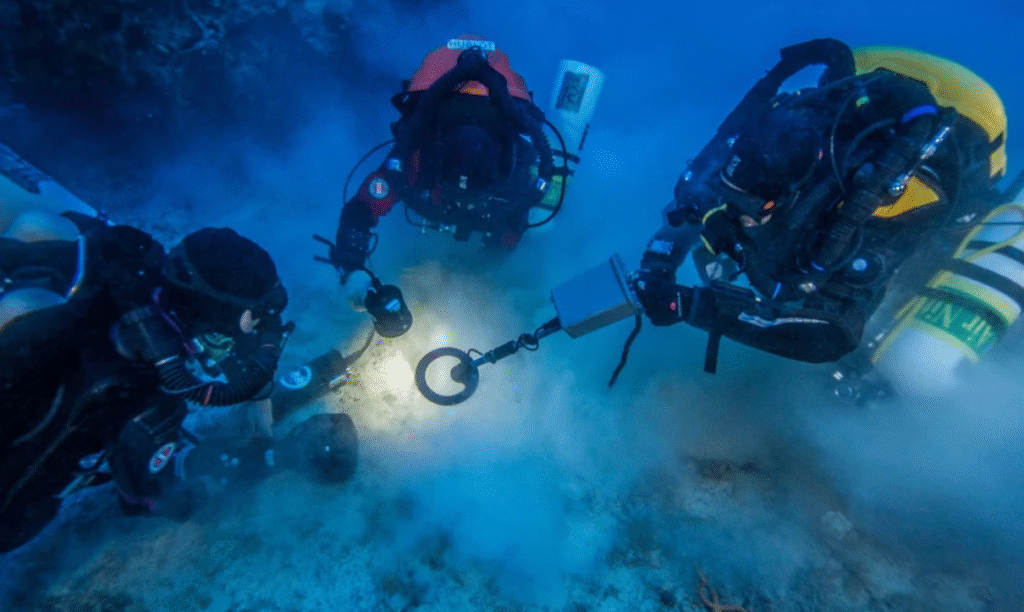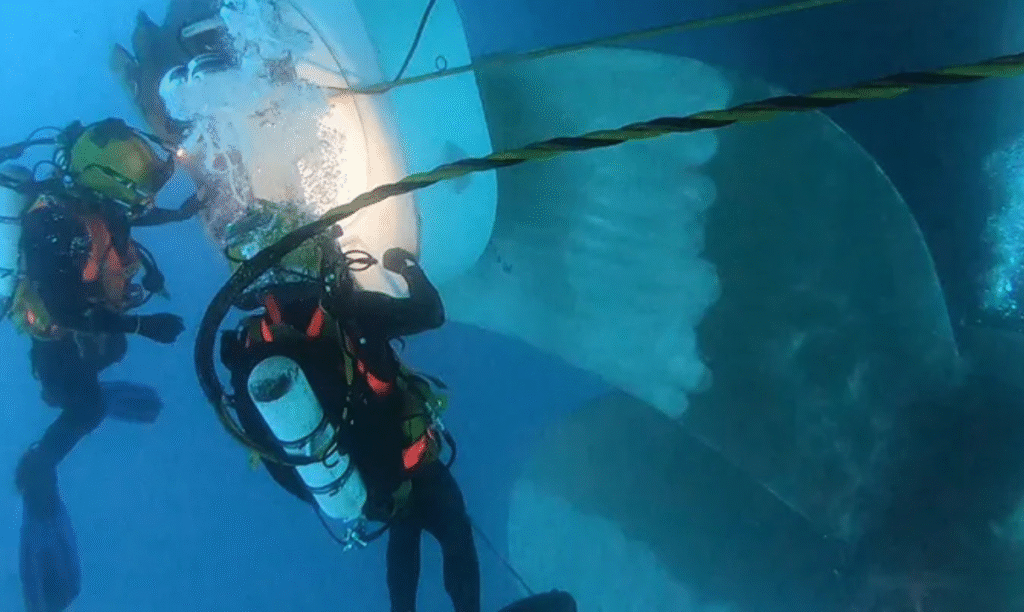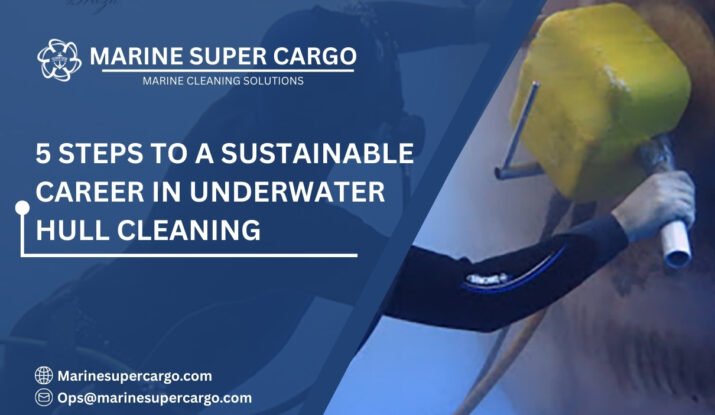Close your eyes and imagine standing on the dock, gazing at a massive ship preparing for its voyage. Above the water, everything looks in order. But below the surface lies a different story—marine growth clinging to the vessel’s hull, increasing drag, fuel consumption, and environmental risks. Who takes on the responsibility of fixing this, diving beneath steel giants to bring them back to life? The answer is you if you choose a sustainable career in underwater hull cleaning.
This career path is unique—it’s not just about maintenance, but about blending environmental stewardship, diver safety, and global compliance standards. With the shipping industry moving toward stricter regulations and greener operations, professionals trained in hull cleaning are in high demand. The critical question is: how do you build a sustainable, fulfilling, and future-proof career in this challenging yet rewarding field?
Why Choose a Sustainable Career in Underwater Hull Cleaning
A career in underwater hull cleaning isn’t just another job—it’s a mission. Without regular maintenance, fouled hulls risk not just efficiency but also environmental non-compliance. Building a sustainable career in underwater hull cleaning matters because:
- It supports global sustainability.
By reducing drag, cleaned hulls save fuel, leading to fewer carbon emissions. - It ensures global compliance.
Organizations like the IMO (imo.org) and conventions like MARPOL (Marine Insight – MARPOL Convention) require hulls to stay clean to prevent invasive species spread and pollution. - It delivers career security.
With tighter port authority regulations (iaphworldports.org), certified professionals will always have demand.
Think of it as becoming both a technician and an ocean guardian—you’re not cleaning for today alone but ensuring cleaner oceans for tomorrow.

Skills You Need to Thrive
Having a sustainable career in underwater hull cleaning is like being an athlete and an engineer rolled into one. Success depends on mastering these skills:
- Diving Proficiency – Professional diver training validated by groups like IMCA (imca-int.com) and ADCI.
- Tool Mastery – Hydraulic brushes, suction systems, and ROVs (remotely operated vehicles) are part of daily work.
- Environmental Awareness – Waste collection and eco-friendly cleaning methods aligned with MARPOL requirements.
- Problem-Solving Aptitude – Unpredictable underwater challenges demand fast responses.
- Reporting and Documentation – Accurate logging is part of compliance and career growth.
Each skill isn’t just technical; it’s a building block for long-term success.
⚓ Expert Underwater Hull Cleaning with Marine Super Cargo 🌊
— Marine Super Cargo (@Marinsupercargo) September 19, 2025
A clean hull means better performance, lower fuel use, and smoother voyages. Marine Super Cargo offers top Underwater Hull Cleaning to keep your vessel efficient, compliant, and ready for every operation. pic.twitter.com/sVKAUCytuS
Certification Pathways
A sustainable career in underwater hull cleaning depends as much on certifications as on diving skills:
- IMCA Diver Competence Certifications – Industry benchmark for safe diving practices.
- ADCI Certifications – International safety and ethical standards for commercial divers.
- MARPOL Knowledge Certification – Understanding and applying pollution control protocols.
- Local Port Certifications – Many ports require cleaning professionals to have specific training for invasive species prevention.
Certifications are your golden tickets, opening doors across fleets and global shipping routes.
Challenges Along the Path
Every career has hurdles. Building a sustainable career in underwater hull cleaning means preparing for:
- Low visibility and cold-water environments.
- High physical demands and mental endurance.
- Risk of regulatory complexity across countries.
- Risk management when using heavy underwater machinery.
Yet each challenge serves as a training ground—strengthening your skillset and resilience.
Benefits of a Sustainable Career
When you commit to a sustainable career in underwater hull cleaning, the payoffs are long-term:
- Global Mobility – Certified hull cleaners are needed by fleets worldwide.
- Environmental Impact – Every dive contributes to cleaner oceans and reduced greenhouse gases.
- Job Security – As regulations tighten, demand continues to grow.
- Financial Stability – Skilled divers can command competitive pay while also taking pride in green work.
This career is not only sustainable environmentally but also personally, professionally, and financially. Learn more about Singapore MPA underwater cleaning.
Best Practices for Sustaining Your Career
To stay future-ready, think of your career like a ship—regular maintenance keeps it on course. For a sustainable career in underwater hull cleaning:
- Update your certifications regularly with IMCA and ADCI.
- Train with digital tools like ROVs to keep pace with industry tech.
- Follow MARPOL and IMO updates to align cleaning practices with new laws.
- Prioritize safety—your long-term career depends on your well-being.
- Always partner with eco-compliant operators (see cleanship.co).
Sustainability here doesn’t stop at ecology—it’s career longevity.
Innovations Shaping the Future
The shipping world is embracing innovation to improve hull cleaning. Professionals building sustainable careers in underwater hull cleaning will step into roles shaped by:
- VR Simulations – For safer diver training.
- AI-Assisted Monitoring – Fuel efficiency and hull fouling risk prediction.
- Blockchain Documentation – For tamper-proof compliance proof.
- Zero-Discharge Vacuum Systems – Eliminating marine waste pollution.
Learning these new approaches today prepares you for relevance tomorrow.

Case Study: Training to Career Growth
Consider a trainee diver who pursued IMCA certification and worked with eco-compliant operators:
- Within 3 years, he advanced to the supervisor level.
- Diversified skills with ROV-assisted hull cleaning.
- Became an environmental compliance lead for inspections.
This showcases how intentional certification and commitment can elevate divers into leadership roles within a sustainable career in underwater hull cleaning.
Conclusion
Building a sustainable career in underwater hull cleaning means choosing a profession that is rewarding, impactful, and future-proof.
- Certifications are your credibility and gateway to opportunities.
- Skills in safety, compliance, and technology turn good divers into great professionals.
- Sustainability ensures not just cleaner oceans, but a safer and more stable long-term career.
For expert guidance on eco-compliant hull cleaning programs and career pathways, visit CleanShip.co.
FAQs:
Q1. What is a sustainable career in underwater hull cleaning?
It’s a career pathway where divers combine technical cleaning expertise with eco-friendly and compliant practices, ensuring long-term demand and environmental benefit.
Q2. Why is sustainability important in this field?
Sustainability ensures divers comply with IMO and MARPOL guidelines, protect oceans, and maintain job security as the industry shifts to green practices.
Q3. Which certifications do I need?
Diving certifications from IMCA/ADCI, along with MARPOL compliance and port-specific accreditations, are essential to progress in this career.
Q4. What challenges might I face?
Harsh underwater conditions, high physical demands, and jurisdictional compliance differences are key challenges, but training mitigates risks.
Q5. What future trends will shape this career?
AI, VR training, blockchain compliance logs, and zero-discharge hull cleaning systems will redefine how sustainable divers build and sustain careers.


